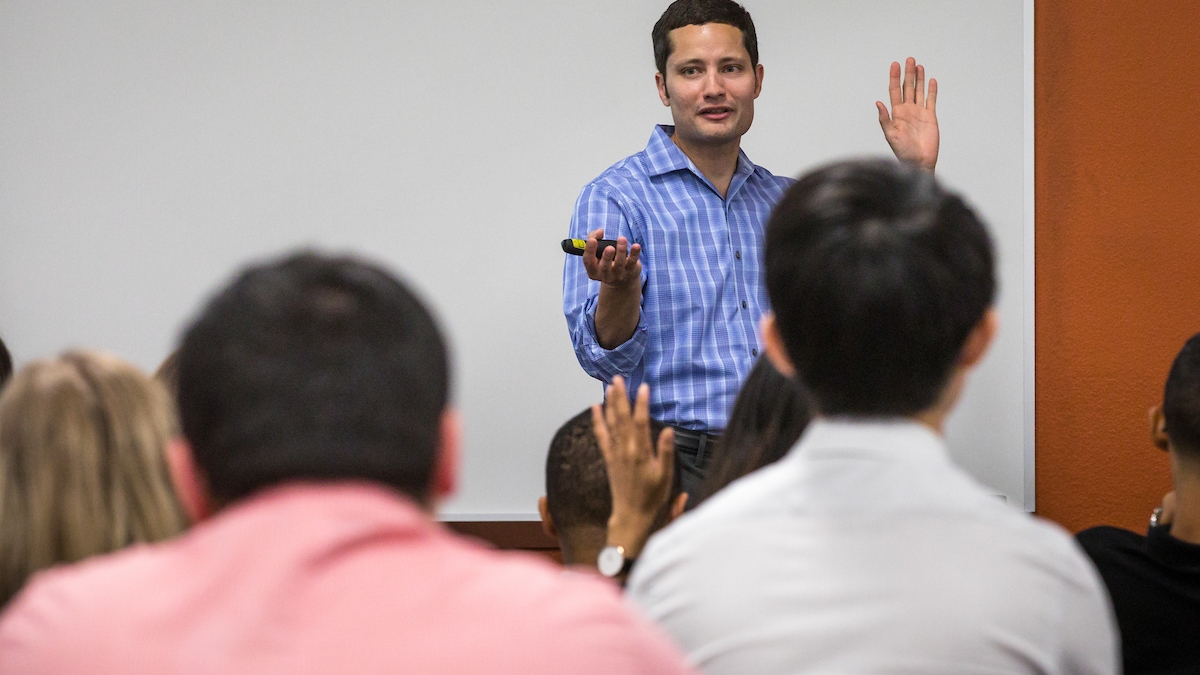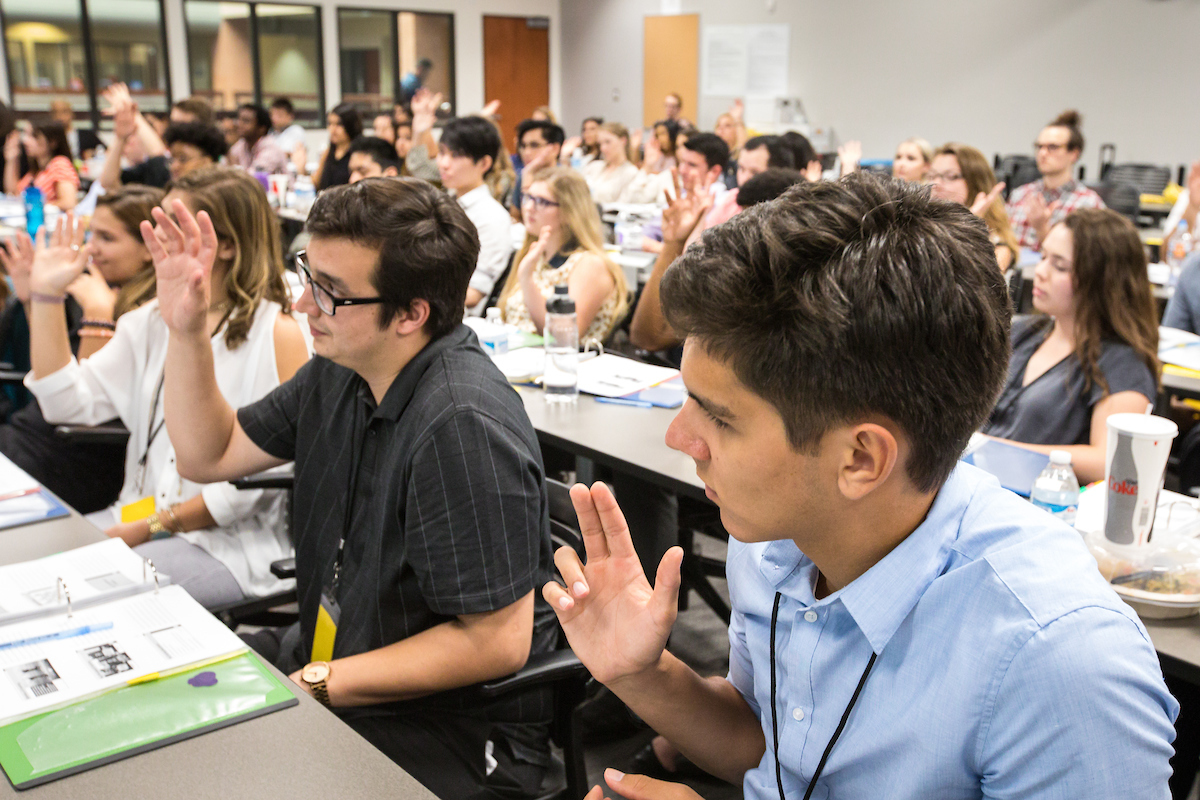Having the right mind-set is critical to doing well in college. In fact, it’s one of the strongest predictors of success.
Getting students in the right mind-set at the start of every fall semester is pretty much Kevin Correa’s job.
“If students can believe in themselves, maintain an optimistic outlook, cultivate a growth mind-set, and learn how to be resilient, then they are already half-way to success,” said Correa, the associate director of Arizona State University's First-Year Success CenterASU's First-Year Success Center is based out of University College..
“We take pride in supporting students holistically.”
The stress, adjustment and expectations of freshman year can make young adults prone to dropping out before the start of their sophmore year — and about 30 percent do, according to a 2014 National Student Clearinghouse study. Students find many challenges when they come to college, including balancing work and school, paying for tuition, not being academically prepared or not being emotionally ready.
The award-winning center, now in its fifth year, knows of those challenges and offers tools to combat those obstacles. Their secret is to treat every student like a VIP through a variety of peer customized coaching services. This success coaching is tailored to individual interests, strengths and needs, and empowers students to thrive both inside and outside the classroom.
The success coaches comprise an army of approximately 75 ASU juniors, seniors and graduate students who perform outreach through phone and email at the start of each semester. They also meet with students on a regular and one-on-one basis. They are supported and supervised by a team of 10 professional staff.
Correa spoke to ASU Now about the center’s work and its mission.
Question: How does your office define student success?
Answer: Student success can take many different forms. We work with students on identifying goals they want to accomplish at the university, and then we coach them to achieve those goals. The goals can be academic, personal or even financial. We take pride in supporting students holistically. One thing with regard to defining student success that all students should be aware of is the Sun Devil Way: achievement, engagement and responsibility.
Q: A few decades ago, students were given a class schedule, a map and pretty much given the boot. Why don’t we do business that way any longer?
A: The university is very different now than it was back then. We now have multiple campuses, thousands more students, a much more diverse student body, over 1,000 student organizations, more than 350 undergraduate majors and countless resources and opportunities. In short, there’s a lot more for students to know and to figure out! That’s where First-Year Success coaching comes in. Our success coaches are able to connect students to the relevant information, resources and opportunities that can make a positive impact in their experience and educational journey.
As higher-education scholar Vincent Tinto has said, “Access without support is not opportunity.” Our job at the First-Year Success Center is to provide peer coaching support so that students can leverage their access to this great university to a life-changing opportunity to achieve their dreams. Our motto is the right person at the right time can change a life. We see that regularly.
Furthermore, as stated in the ASU charter, ASU is measured by whom it includes and how they succeed. Thus, student success is central to who we are as an institution. I think it’s exciting that ASU offers students so many resources and services such as ours that can help them thrive.
Q: What are some of the adjustments or mind-sets students must get into before preparing for college?
A: One of the biggest adjustments for first-year students is the increase in responsibility. In college, students have a lot more responsibility than they did in high school. They are responsible for their daily schedule, going to class, keeping up with their course work, doing their laundry and getting adequate amounts of sleep and nutrition. They might be accustomed to having their parents or teachers ensure these things get done, but in college, it’s all on them. Students call this “adulting”; it’s a major adjustment.
Another significant adjustment is the rigor of university-level classes. There’s a lot more work required at the university level, and the material is much more advanced. Most university students find that they need to study much more in college than they ever did in high school in order to do as well academically. In high school, they might have been able to get away with cramming the night before an exam, but in college, that doesn’t tend to work. To do well at the university, students have to develop much better study habits, critical-thinking skills, note-taking skills and time-management strategies.
As exciting as college is, it’s also very challenging, and it can easily become stressful and overwhelming, which can lead to students doubting themselves, especially if they experience a setback. In these times, students need to take a deep breath and remind themselves that they were admitted to the university for a reason. They’re intelligent and talented, they belong and they are not alone. If students can believe in themselves, maintain an optimistic outlook, cultivate a growth mind-set and learn how to be resilient, then they are already halfway to success. That, plus making sure they use the resources available to them. Our success coaches are trained to help them with making the necessary adjustments and developing the right mind-set to thrive.
Senior Jacob Zarate and other trainees raise their hands admitting to having challenges when first arriving at college as freshmen, at the First-Year Success Center coaches-training session on Aug. 9. Zarate is majoring in both global studies and geography. The 75 juniors and seniors are going through training to learn to be coaches to freshmen transitioning to college. Photo by Charlie Leight/ASU Now
Q: Who are these success coaches, what do they do and how are they trained?
A: Success coaches are juniors, seniors and graduate students who have been successful at the university and who want to help their fellow Sun Devils be successful, too. Their job is to be a connector, cheerleader and catalyst for student success. Since they were freshmen just a couple years ago themselves, they can easily relate to this year’s freshmen and work with them on successfully navigating their first year. The position is one of the most coveted student jobs on campus. Success coaches receive over 40 hours of training before the school year begins, and they receive ongoing training along with professional supervision and support thereafter. We find that students love meeting with their coach, and those who meet with their coach are more successful at the university than those who don’t.
Q: Any words of advice for Mom and Dad?
A: For yourself: Consider getting involved with the Sun Devil Family Association. It can be helpful to connect with other parents who have a student at the university. It’s also a good idea to peruse the ASU parent and family resources website to stay informed and engaged. If possible, attend Family Weekend and other university events.
For your student: Maintain open and honest communication with your student. Talk with them about the exciting aspects of university life as well as the adjustments and challenges they are likely to face. Many students are terrified about the possibility of disappointing their parents, so it’s important to remind your student that you love them unconditionally and they can talk with you about anything. Care packages are always a good idea, especially during finals. College is all about learning, discovery, growth and development, so encourage your student to pursue a study of interest, explore and branch outside of their comfort zone. I also recommend you encourage your student to take things one day at a time and to use the resources available to them. Finally, advise your student to take time to enjoy and appreciate this unique time in their life. These four years will go by fast!
Top photo: Kevin Correa, associate director of the First-Year Success Center, leads new student coaches in a training session on Aug. 9. Photo by Charlie Leight/ASU Now
More Sun Devil community

Dean’s Medalist finds freedom — and a second chance — in literature
When Phoenix resident Wade Sharp was last sent to what he termed “the hole” — solitary confinement in a county jail — he wasn’t sure how long he would be there.“COVID-19 was just starting out,” he…

University Archives chronicles more than 140 years of Sun Devil history
Editor’s note: This is part of a monthly series spotlighting ASU Library’s special collections throughout 2024.What was the name of the butcher who bequeathed the first piece of land that…

3 outstanding ASU alumni named The College Leaders of 2024
Three outstanding Arizona State University alumni from The College of Liberal Arts and Sciences will be named as this year’s slate of The College Leaders. The honor recognizes alumni for their…

